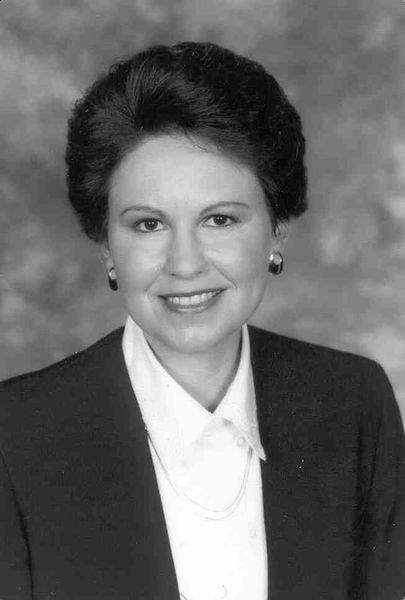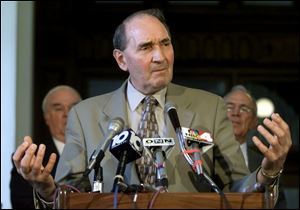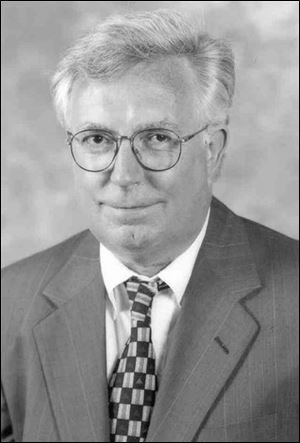
Coalition legal fees $3.6M and growing Ohio taxpayers foot bills for Columbus firm's work
6/17/2001
Bricker lawyer Sue Yount allegedly 'wears her heart on her sleeve.'
HO

William Phillis heads the coalition of 515 school districts.
COLUMBUS - The coalition challenging Ohio's school-funding system has used $3.6 million in tax dollars to pay for legal fees over the last decade - and the meter keeps running.
The Ohio Coalition for Equity & Adequacy of School Funding has used tax dollars supplied by member school districts and court-awarded state dollars to pay its high-powered Columbus law firm - Bricker & Eckler.
In effect, taxpayers are paying for a lawsuit against themselves.
“I've heard a number of citizens express concern that taxpayers are being used to try to obtain more tax dollars from the state,” said State Sen. Randy Gardner (R., Bowling Green).
A bill for at least $1 million more in legal fees is expected to be filed within a few months, and a third is in the pipeline.
Bricker & Eckler, founded in 1945 by former Republican governor and U.S. senator John Bricker, boasts 113 attorneys and is housed in Columbus' historic Old Post Office, one block from Statehouse Square downtown.
As the state Supreme Court prepares to release its third decision in the controversial case, there is no end in sight to the decade-long litigation - and no end to the amount that Bricker & Eckler will receive in legal fees.
“A change in the way Ohioans think about state responsibility may take several years,” Bill Phillis, the coalition's executive director, told the group's steering committee in August, 1999.
The coalition pays most of its legal bills with tax dollars supplied by 515 school districts - which pay 50 cents per student in dues each year to be a member of the organization. The second largest district in the coalition is the Toledo Public Schools, which paid $18,860 this school year in dues.
In 1997 the Supreme Court ruled 4-3 in the coalition's favor, saying the state relied too heavily on property taxes to finance public education. After that ruling, a judge in southeast Ohio who handled the original lawsuit ordered the state to pay the coalition $1.3 million for attorney fees and expenses. A furor followed the award, with legislators accusing Bricker & Eckler of trying to gouge state taxpayers.
Sometime this summer Bricker & Eckler plans to seek more state dollars for attorney fees and expenses. And if the state loses the latest round in the school-funding case, a third bill would be sent to the state.
So far, the coalition has not returned any of the state tax dollars paid for attorney fees to the school districts that pay dues.
The topic came up at a steering committee meeting of the coalition on Nov. 10, 1997, according to records obtained by The Blade under the state's public records law.
“Executive Director Phillis reviewed some basic facts regarding the coalition ... that fees of coalition members would be returned to districts on a percentage basis upon state of Ohio payment of plaintiff's fees and expenses ...,” minutes of the meeting state.
In a recent interview Mr. Phillis said the “deal is when the coalition disbands, all of the assets will go back to the school districts - anything that is left over, including attorney fees.”
Nicholas Pittner, the lead Bricker & Eckler attorney representing the coalition, said it's unclear when the school-funding lawsuit will end.
Mr. Phillis said he has received no complaints from districts that dues have not been reimbursed.
“I trust Bill Phillis and Nick Pittner,” said Susan Miko, superintendent of the Gorham-Fayette Local Schools, who was appointed to the coalition's steering committee on May 18.

The recipient of $3.6 million in legal fees ultimately paid by Ohio taxpayers is Bricker & Eckler, a firm of 113 lawyers headquartered in Columbus.
In 1988, several superintendents from rural southeast Ohio and other poor districts formed the Coalition of Rural and Appalachian Schools because of their concerns that they didn't have enough money to educate their students.
In 1991, the coalition decided it would have to sue the state of Ohio to establish a fairer system of paying for schools, but it needed a war chest to take on the state. Districts across Ohio were invited to join in the suit, which was filed as DeRolph v. State of Ohio.
The suit was named for Nathan DeRolph, a 15-year-old sophomore at Sheridan High School in Perry County, who had to sit on the floor because there were not enough chairs in his history class.
The new group of school districts - the Ohio Coalition for Equity & Adequacy of School Funding - filed its lawsuit in 1991 in Perry County. It was assigned to Common Pleas Court Judge Linton Lewis, Jr.
In 1994, Judge Lewis ruled in favor of the coalition, striking down Ohio's school-funding system as unconstitutional. The state appealed, and in a 2-1 decision the Canton-based Fifth District Court of Appeals overturned the ruling.
The coalition then appealed to the Ohio Supreme Court, which in March, 1997, ruled 4-3 for the coalition, turning Ohio politics upside down.
The legislature, controlled by anti-tax Republicans, placed a sales-tax increase on the ballot in 1998, which voters turned down 4 to 1. After that, the legislature gave more money to schools, but in a second 4-3 decision in May, 2000, the Supreme Court ruled the state had not done enough and ordered state lawmakers to submit a new plan by June 15, 2001.
The Ohio legislature has responded to the Supreme Court's rulings by pouring billions of dollars into school construction and repairs and giving $1.4 billion more to Ohio school districts in the two-year budget recently signed into law. State education officials have fine-tuned the formula for how they hand out state aid to districts, but state lawmakers have not dismantled the property-tax system.

Nick Pittner leads Bricker & Eckler lawyers in the school case.
In its 1997 ruling in favor of the coalition, the Supreme Court ordered the state to pay the coalition's legal bills and sent the lawsuit back to Judge Lewis to determine how much that reimbursement should be.
The coalition asked the judge to approve $5 million in attorney fees, expenses, and other costs. In a memo to steering committee members, Mr. Phillis said the $5 million sought was “reasonable and defensible.” He calculated the total as 38 cents per child for each year of the litigation.
Mr. Phillis advised steering committee members what to say if reporters called: “... the state is to blame for causing the harm and not admitting the wrong much earlier, which could have avoided the expense.”
But GOP lawmakers viewed the $5 million request differently, accusing Bricker & Eckler of seeking a “bonus” from state taxpayers and alleging that Mr. Pittner increased the $143 hourly rate he charged the coalition to $190 when he billed the state.
John Beavers, then the managing partner of Bricker & Eckler, said the firm had given the coalition a discount because of its efforts to improve Ohio's education system.
The state hired Keith McNamara, a veteran Columbus attorney, to examine the two-foot-high stack of bills that Bricker & Eckler submitted. Mr. McNamara said it was difficult to determine if the bills were reasonable because they were so vague. For example:
Mr. Pittner and Mr. Phillis said they could not recall what those “tactics” were. Mr. McNamara said he could not determine that as well.
“I don't recall the term `scare tactics,'” Mr. Pittner said.
Bricker & Eckler fought back, accusing Mr. McNamara of making “inflammatory accusations.”
“He was critical of things I suspect he didn't understand,” Mr. Pittner said in a recent interview.
For example, Bricker & Eckler identified state Department of Education employees to testify in the case after seeing their names in news stories, the firm said in court records.
But Mr. McNamara said he told several people that if Tom Workman, then a partner with Bricker & Eckler, had seen the billings records before they were filed, they would not have been submitted.
“Tom came up to me one day and agreed with what I had said,” Mr. McNamara said.
Mr. Workman, who is now president of the Life Insurance Council of New York, declined comment.
After Mr. McNamara submitted his report to Judge Lewis, Bricker & Eckler reduced the amount it had requested from the state.
In December, 1998, Judge Lewis awarded the coalition $1.3 million for the legal work that Bricker & Eckler did from 1991 to 1997. He said it would have been “inappropriate” to allow Bricker & Eckler to charge the coalition a certain rate and then let them charge the state more.
Of the $1.3 million awarded, the coalition kept $802,047 it had already paid to Bricker & Eckler, Mr. Phillis said.
The remaining $511,730 went to Bricker & Eckler.
The law firm received those dollars because it had agreed to cap its fees to the coalition at about $800,000 - but was entitled to more if the state awarded attorney fees, Mr. Phillis said.
But the dispute wasn't over.
In February, 1999, Judge Lewis awarded the coalition an additional $626,481 for attorney fees.
The state appealed. Nine months later the state and Bricker & Eckler settled the dispute, with the state agreeing to pay $300,000 to the firm and the coalition.
Mr. Phillis said the coalition has paid Bricker & Eckler a total of $3.6 million in legal fees.
By contrast, the state Attorney General's office has paid $1.85 million to three law firms for outside counsel in the school-funding lawsuit.

Bricker lawyer Sue Yount allegedly 'wears her heart on her sleeve.'
Senate President Richard Finan (R., Evendale) said after the first Supreme Court school-funding decision came out in 1997 he talked with Mr. Pittner and Sue Yount, another Brickler & Eckler lawyer, about settling the lawsuit. “It was like talking to a brick wall,” said Mr. Finan. “There was no compromise or give whatsoever. They think they've got the Supreme Court locked, and as long as they feel that way, there's no basis for compromise.”
Mr. Finan, who is an attorney, said Ms. Yount “wears her heart on her sleeve.”
“You're supposed to never let yourself get emotionally involved in your client's problems. When you do that, you really ought to get out because you're not a fair and impartial judge,” he said.
Ms. Yount did not return messages seeking comment, and Mr. Phillis said he was unaware of any potential settlement talks. Mr. Finan said he wouldn't let Mr. Pittner and Ms. Yount include Mr. Phillis in the Statehouse meetings.
Mr. Finan said he is disappointed that superintendents who are members of the coalition's steering committee have not pushed Bricker & Eckler to negotiate a settlement of the school-funding lawsuit.
The Blade reported June 10 that although the steering committee has 95 voting members, 32 members, on average, have attended monthly meetings since 1997. Nineteen of the current members have shown up at more than half the meetings in the last four years, in part because of rapid turnover.
“There's not a whole lot of audience participation in this game,” Mr. Finan said.
Mr. Phillis said he expects the request for legal fees to be at least $1 million - to reimburse the coalition for the money its has paid to Bricker & Eckler.
Asked why the coalition has not requested reimbursement for attorney fees dating back to 1997, Mr. Pittner replied: “No one has had time to worry about it.”
But Mr. Finan believes the real reason the additional $1 million in legal bills from Bricker & Eckler has not yet been submitted is because the coalition is concerned the bill may hurt its case before the Supreme Court.